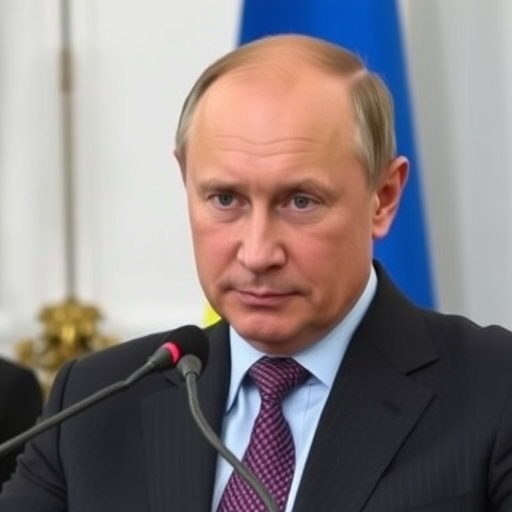Ukraine Allies Commit to Eradicating Russian Oil from Global Markets as Sanctions Escalate Against Putin
In a dramatic escalation of the Ukraine war, UK Prime Minister Keir Starmer has spearheaded a bold international pledge to completely remove Russian oil and gas from the global market. This announcement, made during a high-stakes summit in London, signals a unified front among Western allies determined to choke off President Putin‘s war machine by targeting Russia’s lucrative energy exports. As the conflict hurtles toward its fourth brutal winter, Ukrainian President Zelensky has intensified calls for the United States to broaden Russian oil sanctions beyond just two companies, aiming to dismantle the entire sector.
London Summit Forges ‘Coalition of the Willing’ Against Russian Energy Dominance
The Coalition of the Willing convened in London on a crisp autumn day, bringing together leaders from the UK, EU nations, the US, and other key allies to strategize on amplifying economic pressure on Moscow. Hosted at the Foreign Office, the meeting underscored a growing consensus that partial measures are no longer sufficient in the face of Russia’s unyielding aggression in Ukraine. Prime Minister Starmer, addressing the assembly, declared, “We stand united in our resolve to starve Putin’s regime of the revenues that fuel this senseless war. Russian oil and gas must be excised from global trade like a malignant tumor.”
This coalition, first formed in the early months of the invasion in 2022, has evolved from ad-hoc responses to a structured alliance focused on enforcement and innovation in sanctions. Participants included representatives from G7 countries, as well as Ukraine itself, highlighting the summit’s urgency. Data from the International Energy Agency (IEA) reveals that Russia still supplies around 8% of global oil despite previous bans, generating over $100 billion in revenues since the war began—funds that have directly supported military operations. The London gathering aimed to close these loopholes, with discussions centering on coordinated enforcement mechanisms to prevent shadow fleet tankers from circumventing restrictions.
One key outcome was the agreement to accelerate the phase-out of Russian liquefied natural gas (LNG) imports in Europe, where volumes have paradoxically risen by 40% since 2022 due to redirected flows from Asia. Experts at the summit cited a recent European Commission report estimating that full implementation could deprive Russia of $50 billion annually, a figure that resonates deeply amid Ukraine’s ongoing struggles. The atmosphere was charged with determination, as delegates shared intelligence on Russian evasion tactics, including the use of third-party flags and opaque shipping companies.
Starmer’s Vision: A Sanctioned World Without Russian Fuels
At the heart of the London summit was Prime Minister Keir Starmer’s impassioned vision for a fossil fuel-free future from Russia. In his opening remarks, Starmer emphasized the moral imperative: “Every barrel of Russian oil sold funds the missiles raining down on Ukrainian cities. We have the tools to stop this—now we must wield them without hesitation.” This pledge builds on the UK’s earlier actions, such as its 2022 ban on Russian oil imports, which reduced direct purchases by 95%. Yet, Starmer acknowledged the challenges, noting that global interdependence complicates total exclusion.
Under Starmer’s leadership, the UK has invested £1.5 billion in alternative energy infrastructure to mitigate domestic impacts, including new LNG terminals and renewable projects. The summit’s joint communique outlined a multi-phased approach: immediate tightening of price caps on Russian crude, enhanced monitoring of financial transactions, and diplomatic pressure on non-aligned nations like India and China, which continue to import vast quantities. According to Bloomberg data, India’s Russian oil imports surged 80% in 2023, often resold to Europe at a premium— a loophole the coalition vows to seal.
Starmer’s rhetoric drew applause from attendees, but it also sparked debates on feasibility. Energy analysts, such as those from the Oxford Institute for Energy Studies, warn that abrupt removal could spike global prices by 10-15%, potentially fueling inflation in vulnerable economies. Nonetheless, Starmer countered these concerns by highlighting long-term gains: “The pain of transition pales against the horror of prolonged war. Our economies are resilient; Putin’s are not.” This stance positions the UK as a linchpin in the anti-Russian effort, with Starmer emerging as a vocal advocate for Ukraine on the world stage.
Zelensky’s Urgent Plea: Expand US Sanctions to Cripple Russia’s Oil Empire
President Volodymyr Zelensky, joining the summit virtually from Kyiv amid ongoing drone attacks, delivered a stark message that electrified the room. “Sanctions on two companies are a drop in the ocean,” Zelensky urged, referring to recent US measures against entities like Sovcomflot, Russia’s state shipping firm. “We need a total embargo on Russia’s oil sector to truly weaken Putin. Every day of delay costs Ukrainian lives.” His words, delivered with the raw emotion of a leader under siege, underscored the human stakes of the Ukraine war.
Zelensky’s call comes as the US, under President Biden, has imposed over 2,500 sanctions since February 2022, yet Russia’s oil production hovers at 10 million barrels per day—near pre-war levels—thanks to discounted sales to BRICS nations. The Ukrainian president advocated for secondary sanctions on buyers and enablers, potentially targeting banks in Turkey and the UAE that facilitate deals. A Zelensky aide revealed that Ukraine has compiled a dossier of over 300 entities evading current restrictions, ready for allied action.
This push aligns with broader trends in Russian oil sanctions. The EU’s 14th sanctions package, adopted in June 2024, banned another 15 ships from the shadow fleet, but Zelensky argues for more. Quoting from his address, “Putin bets on our fatigue. Let us show him the West’s unbreakable will.” US Treasury officials at the summit nodded in agreement, hinting at forthcoming expansions, though political hurdles in Congress loom large. Zelensky’s plea not only galvanized allies but also highlighted Ukraine’s strategic insight into Russian vulnerabilities, drawing from frontline intelligence.
Winter’s Shadow: Intensifying Pressure as Ukraine Braces for Fourth Year of Conflict
As the Ukraine war enters its grueling fourth winter, the London pledges take on added urgency. Russian forces have intensified assaults on energy infrastructure, leaving millions of Ukrainians without heat or power. The IEA reports that Ukraine’s grid has lost 50% capacity since 2022, with repairs hampered by constant bombardment. In this context, stripping Putin of oil revenues—estimated at $180 billion since the invasion—becomes a lifeline for Kyiv’s defense.
The summit addressed seasonal challenges, including Russia’s weaponization of gas supplies, reminiscent of the 2022 Nord Stream sabotage. Allies committed £500 million in humanitarian aid for winter resilience, focusing on generators and insulation for vulnerable populations. Putin, facing domestic unrest from economic strains, has retaliated with hybrid tactics, such as cyberattacks on European energy firms. A NATO assessment presented in London warned of heightened risks, prompting vows for cyber defenses.
Broader implications ripple through global markets. OPEC+ decisions, influenced by Russian lobbying, have stabilized prices, but analysts predict volatility if sanctions bite harder. The World Bank forecasts a 2% dip in global GDP if Russian exports halve, yet Ukraine’s economy, down 30% since 2022, stands to rebound with sustained support. Voices from the Global South, including South Africa’s delegate, urged balanced approaches to avoid energy poverty, adding nuance to the coalition’s strategy.
Looking ahead, the pledges set the stage for G20 confrontations and UN debates, where Zelensky plans personal diplomacy. Starmer announced a follow-up virtual summit in December to monitor progress, while the US signaled readiness for executive actions on oil majors like Rosneft. If realized, this could accelerate Russia’s isolation, forcing Putin to the negotiating table—or deepen the war’s entrenchment. As winter descends on Ukraine’s scarred landscapes, these economic weapons offer hope amid the cold, a testament to allied solidarity in the face of tyranny.








